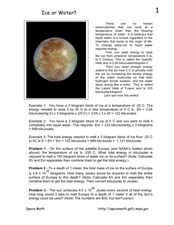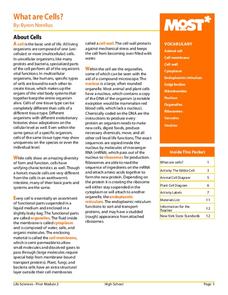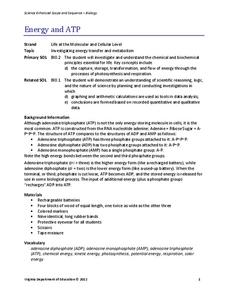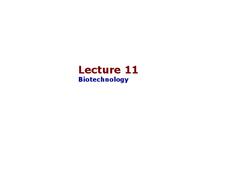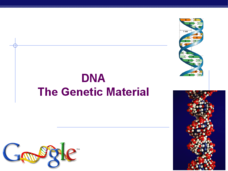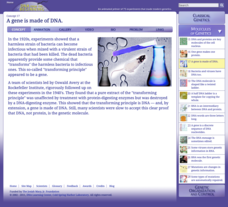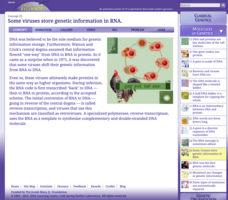Towson University
Case of the Crown Jewels
Can your biology class crack the Case of the Crown Jewels? Junior forensics experts try their hands at DNA restriction analysis in an exciting lab activity. The lesson introduces the concept of restriction analysis, teaches pipetting and...
Kenan Fellows
Unit 2: DNA Analysis
Ever wonder how they solve those mysterious murders in TV crime dramas? The second of four units in a Biotechnology series introduces scholars to the many methods of DNA analysis. Pupils create and run their own gel electrophoresis...
Curated OER
Heat Transfer & Phase Changes
In this heat transfer and phase change worksheet, students experiment with ice, salt, and milk to show the relationship between the temperature of a solution and its phase. Students turn milk from a liquid to a solid and graph the...
Curated OER
Ice or Water?
In this ice and water activity, learners read about the energy needed to transform ice to liquid water. Students solve 3 problems where they calculate the energy needed to melt ice given different scenarios in space.
Curated OER
Plankton / Phytoplankton
Learners discuss the importance of plankton in the ocean ecosystem. For this biology lesson, students identify the different types plankton by observing them under the microscope. They explain how plankton population affect global climate.
Curated OER
Atoms and Elements: An Introduction
Students are able to discuss the difference between a proton, a neutron and an electron. They also can explain the difference between an ionic and a covalent bond. Students know the main structure of atoms and molecules. Student are able...
Curated OER
What Are Cells?
Energize the cells of young biologists with an edible life science activity. Engaging learners in exploring the inner workings of plant and animal cells, this activity involves using colored jello and various sweet and tasty treats to...
Curated OER
Studying our Senses
Who would not want an opportunity to taste jellybeans in class? During this investigation, life science learners hold their noses as they take a taste test and find that our perception of flavor is connected with our sense of smell. In...
Virginia Department of Education
Energy and ATP
Take charge of your biology class by using this exciting analogy to relate the ATP process with batteries. Pupils use batteries and rubber bands to simulate the phosphate bonds between molecules in the body. They measure the distance in...
National Nanotechnology Infrastructure Network
Biology Reference Sheet
First year life science or biology pupils will appreciate this all-inclusive reference page. It provides a diagram of both a plant and an animal cell, the metric system prefixes, classification levels, definitions for cell processes, the...
NOAA
Animals of the Fire Ice
When the sun's rays can't reach the producers in a food web, where does all the energy come from? Extreme environments call for extreme food sources. Young scientists investigate creatures that appear to get their energy from methane...
Cornell University
Bacteria Take Over and Down
Bacteria outnumber all other forms of life on Earth. Scholars observe the growth of bacteria in petri dishes to understand their role in maintaining good health. Then, they observe the growth of bacteria after they introduce...
Exploratorium
Your Sense of Taste
A simple and sweet activity shows students how important smell is in interpreting flavor. Pairs of pupils hold their noses and eat Life Savers®, only to find that they can't identify the flavors until they let go. You will appreciate...
Curated OER
The Marvels of Mud
Young scientists roll up their sleeves and get a little dirty in this three-day earth science investigation. Following the scientific method, children monitor the growth of algae in pond water samples in order to determine the role that...
Curated OER
Biotechnology
The metaphors used here to describe the "cut and paste" procedures for genetic engineering will really help your biologists in their understanding of restriction enzymes and DNA. The uses of genes that are isolated and incorporated into...
Curated OER
DNA: The Genetic Material
The various experiments and processes that were completed in the 20th century to further our understanding of DNA are summarized here. There are wonderful slides to popularize the scientists who dedicated their professional life to...
K12 Reader
What’s in Your Cells?
Organelles, cellular respiration, ATP, and DNA. The passage attached to this life science reading comprehension worksheet is all about cells. After reading about diffusion and osmosis, kids answer a series of questions based on the text.
Center Science Education
The Nitrogen Cycle Game
Earth science experts learn about the roles of nitrogen by taking a virtual journey through the nitrogen cycle. Completing a passport worksheet along the way, they move from place to place around the classroom by the toss of dice. Each...
Curated OER
The Water Cycle
Your class sets up a mini water cycle model to examine the process. Then they watch an animation, following a water molecule through the cycle. A well-developed lab sheet guides learners through the lesson and a PowerPoint presentation...
NOAA
The Biogeochemical Cycle
The biogeochemical cycle ... no physics? The fourth installment of a 23-part NOAA Enrichment in Marine sciences and Oceanography (NEMO) program introduces the biogeochemical cycle by having pupils simulate movement between Earth's...
Cold Spring Harbor Laboratory
A Gene Is Made of DNA
Does a protein or DNA store genetic instructions for life? Follow the research from the 1920's experiments on mice through the 1940's experiments on bacteria to learn the answer to the difficult question. Scholars use an online...
Cold Spring Harbor Laboratory
Development Balances Cell Growth and Death
Cells demonstrate a life cycle like other living things, but what if death was no longer part of the cycle? Learn about the important balance requiring death to continue functioning. An online interactive introduces a group of scientists...
Cold Spring Harbor Laboratory
Some Viruses Store Genetic Information in RNA
Can a high school program alter the entire course of your life? David Baltimore and Howard Temin participated in high school programs working in research laboratories and went on to win the 1975 Nobel Prize. Learn about these two...
Curated OER
Energy Extravaganza
Tenth graders study how cells and organisms acquire and release energy through photosynthesis and cellular respiration. They explain that living organisms use matter and energy to synthesize a variety of organic molecules and they will...





